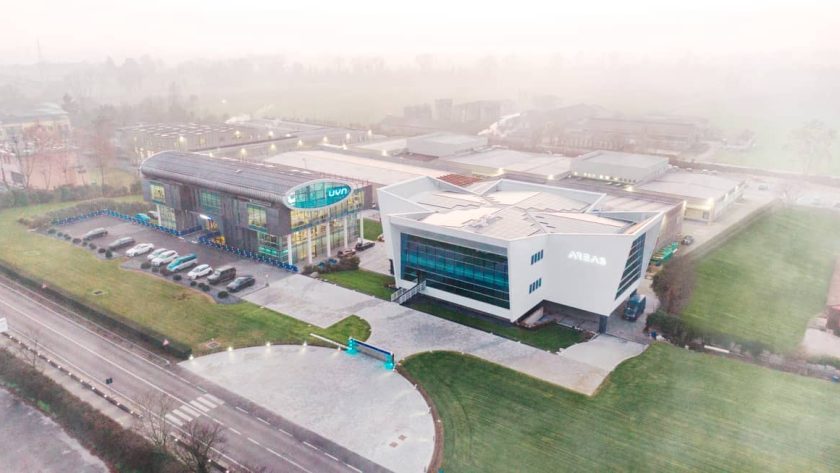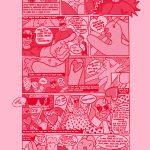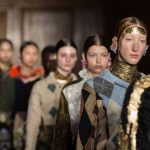Athletes demand a lot from their clothing in a wide range of weather conditions and circumstances. It is often difficult for amateur athletes in particular to find the right item for their specific requirements when they are faced with a large selection in a shop. To counter this problem right at the start of production, the Italian sportswear company Unleash Your Nature (UYN) is now opening the doors of its new research and development laboratory to end consumers. FashionUnited was on site for the official opening and took a look around the premises.
The headquarters of UYN’s parent company Trerè Innovation is located in Asola, Italy, about half an hour from Lake Garda, which is popular with tourists. In addition to the new ‘Areas’ research centre, the site also houses the showrooms of UYN and bicycle manufacturer Titici. It is also home to logistics with a robot-powered warehouse as well as production for UYN.
Visitors can gain insights into these different areas and learn how products are manufactured, recycled, tested and distributed as part of a guided tour, which is followed by a visit to the UYN flagship store in Asola.
UYN and Areas tour :
- A tour of the Trerè Innovation site can be booked via the Areas Academy and UYN Sports websites. These are offered from Monday to Friday (excluding public holidays) and start at 10.30 am. Participation is free for existing customers who can provide proof of ownership of a UYN product and for children under the age of ten. Otherwise, a ticket costs 20 euros, or 15 euros per person for groups of between 5 and 20 people.
Areas: research and development lab
The “brain” of the sporting goods group, as Marco Redini, CEO of Trerè Innovation, calls the new ‘Areas’ building (which opened last year), awaits visitors directly at the entrance. The 3,500 square metre building houses the research and development laboratory, an academy for scientists and young talents in the textile sector and a creative hub for product and communication design.
“Areas was born out of a dream, the dream of creating the world’s most advanced research academy in technical apparel,” explained Redini. “We didn’t just want to create a physical space, we wanted to create ideal conditions that would allow several areas of knowledge to come together: from science to design, from communication to art. Ground-breaking innovations can be developed from the interplay of these areas of knowledge.”
In the entrance area of the two-storey building, special collaborations – such as with luxury fashion house Dior and French designer Philippe Starck as well as the latest developments, such as a temperature-regulating jacket with a sensor system – give visitors a first taste of what to expect here.
Biotechnological unit
Adjacent to this small showroom – behind a locked automatic door – is the biotechnology unit, where new biomaterials and end products are tested exhaustively. For example, mechanical and chemical tests are carried out on yarns using various devices that are to be used for new products. End products are also tested for abrasion resistance, colour fastness, pH value of the components and wash resistance, among other things. For example, there is a device that tests the stretchability of running shoes under constant repetition and an oven that checks the shoes for temperature and durability.
Brain unit
Right next door is part of the so-called ‘Brain Unit’, where athletes’ products are tested. An athletes’ movements and cognitive abilities are also examined and analysed here.
Flexible treadmills that can simulate different inclines and other conditions, flexible cycling stations and a reaction wall are used for this purpose.
The humanoid robot ‘Hyper’ is also stationed here, which can simulate the physiological reactions of the human body as well as functions such as overheating, cooling and perspiration using 35 independent thermal zones. Additional sensors test the breathability and insulating properties of the clothing.
Weather resistance is then tested in a separate area in the basement. Various climate chambers are located here. In the cold chamber, clothing is tested at minus 20 degrees, for example the customised clothing for ultra-cyclist Omar Di Felice for the first time – the UYN athlete is planning to cross Antarctica again on his bike at minus 40 degrees at the end of the year. A thermal camera will analyse how body heat is distributed. In addition, an oversized rain shower in the monsoon chamber tests if products are waterproof with intense water jets.
Research and training
The results of these tests are analysed together with the ‘Sport, Mountain and Health’ research centre (CeRiSM) at the University of Verona, with which Trerè Innovation has been working for several years. Thanks to this cooperation, the data collected can be used to develop new collections.
Since last year, the collaboration has been expanded through a scholarship for a doctor of philosophy (Ph.D.) in the field of ‘Neurosciences, Psychological and Psychiatric Sciences and Human Movement Sciences’, funded by Trerè Innovation, the University of Verona and the Italian Ministry of Higher Education Research.
In this three-year research project, the current scholarship holder is working on “biomechanical models for the development of innovative running shoes”. This person will be supervised by tutors from the University of Verona and from the company and will be able to use the scientific instruments at various laboratories.
This includes the part on the top floor of the building where ideas and visions come together from various experts in the fields of science, engineering, industrial and graphic design and other creative minds, including CeRiSM. This open, simple area, which is equipped with several desks and workstations, is aptly named “Creativity”. The group has already developed various innovations here, such as seamless running pants, new shape concepts for ski base layers based on artificial intelligence and heatable socks. These are presented in a small separate area, divided only by yellow slats. Bio-based material innovations such as polyamide made from castor oil are also presented on this floor, as they are seen in the UYN stores.
The Areas project is to be expanded in the coming years to include a campus for students, visitors and customers, Redini reported. University graduates will also be supported in the existing Areas Academy with work and credit programmes for technical clothing.
More than 2 million euros have already been invested in Areas to date.
Production
Behind the façade – consisting of the headquarters and Areas buildings – which features large glass fronts and modern architecture, are the production and logistics halls of the group, which has been operating under the name Trerè Innovation at this location since the business was established.
Around 2.4 million socks, 300,000 pieces of underwear, 180,000 pairs of shoes and 35,000 jackets are produced in the factory halls every year. A single machine produces 240 socks per day. But it is not just clothes that go through the machines in the factory. In addition to a machine for shoes, parts for car seats for an external automotive group are also produced. In order to guarantee quality, the goods are also tested during production. A product is subjected to various tests every four hours.
Circular economy and recycling
As UYN focuses on eco-design with its bio-based fibres such as kapok and eucalyptus, the company also strives to stimulate the circular economy with its products.
Customers have the option of sending their products to UYN, where employees first try to repair them. If a repair is no longer possible, UYN replaces the product and shreds the pieces, which are used as filling material for jackets. UYN has been offering a lifetime guarantee on its socks since this month and intends to roll this out to other product categories.
About Trerè Innovation and UYN
The story begins in the 1950s, when Luigi Redini, together with his brother and father, reorganised the family business and converted it to a production concept for technical and sporty socks. Around 30 years later, the current boss Redini becomes part of the company and initiates the expansion of the product range to include functional clothing.
2016 saw the launch of the UYN brand, which covers clothing, shoes and accessories for a wide range of sports such as skiing, padel and the individual areas of cycling and running. The transition from socks to running and leisure shoes was a particularly smooth one, as the technical socks are one of the main components of the shoe and are then bonded to a few parts such as the outsole.
Taking into account different models, colours and sizes of socks, shoes and clothing, the company offers around 10,000 products.
The UYN brand achieved a wholesale turnover of 30 million euros last year, and 7 million euros in Germany. Trerè Innovation’s goal is to achieve a turnover of 100 million euros this year. In view of the first nine months, the company is making good progress, according to Redini.
FashionUnited was invited to tour UYN.
This article was originally published on FashionUnited.de. Edited and translated by Simone Preuss.



